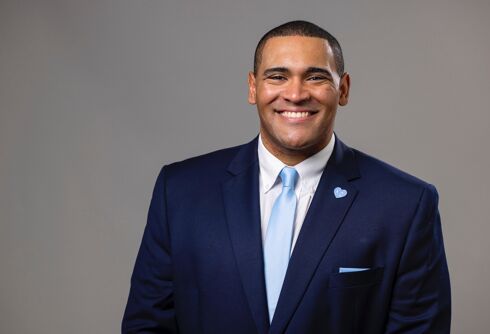On October 6, 2021, I traveled with a friend to Ruleville, Mississippi to lay flowers on the grave of Fannie Lou Hamer on her 104th birthday.
When people speak of Mrs. Hamer, they often talk about her work advocating for voting rights for Black people in the Mississippi Delta, her powerful oratory skills, and her famous quote, “I am sick and tired of being sick and tired.”
Related: Andrea Jenkins on the power of Black Trans resilience
When I think of Mrs. Hamer, I think of her singing “This Little Light of Mine” in a bus full of hopeful Black voters to galvanize their spirits as cop cars impeded their path to the polls. I think of the Freedom Farms Cooperative she founded to fight food insecurity in her hometown. But mostly, I think of her final resting place.
Never Miss a Beat
Subscribe to our newsletter to stay ahead of the latest LGBTQ+ political news and insights.
The Fannie Lou Hamer Memorial Garden is a quiet, peaceful oasis standing shoulder to shoulder with the homes of the children, grandchildren, and even great grandchildren of Ruleville, MS benefitting from Mrs. Hamer’s legacy. I cannot think of a more perfect way to be memorialized as an organizer. A spot of beauty and memory arm in arm with the very people Mrs. Hamer loved most.
This Black History Month is marred by what seems to be the assured collapse of US “democracy,” a global pandemic that is mutating faster than collective consciousness, and Black people continuing to receive the least while doing the most. It feels like the worst time to be a leader at a time where leadership is needed above all else.
It’s because of this that Mrs. Hamer’s legacy feels so particularly present to me. The youngest of 20 children born to sharecroppers as well as a sharecropper herself, Mrs. Hamer’s life was marred by medical abuse, police brutality, and so much more. Yet her words always rang with truth, self-determination, and most amazingly of all, hope.
Of the many lessons Mrs. Hamer has taught me, one of the most important is that Black history is not singularly made of titans. Radical change is not solely orchestrated by the activist who is granted the title, the platform, and the support. The most important people in history are not only those whose names are written down. The largest waves are sometimes made by the smallest ripple.
Black people, particularly Black Trans people, never forget the divinity you posses in every single thing you do. Whether you are the ripple, the wave, or the shores caressed by the water’s edge, please remember that you are our living, breathing history. You are capable of leadership. You are capable of following. You are capable of being utterly, blissfully, wonderfully unmemorable.
Because what a gift it would be to be granted anonymity as a Black person in this country that treats our bodies as targets. Whatever role you play in the ocean, play it fully. Even if these are the end of days (’cause girl it really be feelin’ like that sometimes…) let’s go out as Mrs. Hamer taught us: arm in arm with the people we love the most and singing a song.
Activist Ianne Fields Stewart is the founder of the Okra Project, which seeks to address the global hunger crisis faced by Black trans people by providing home-cooked meals and other resources.
Don't forget to share:














